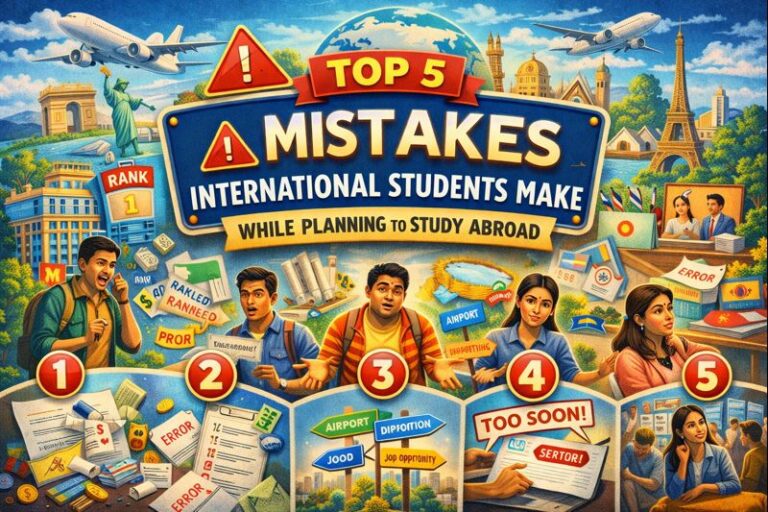Do you often find yourself asking these questions:
- How to improve my study abroad profile?
- Is it possible to go abroad with just 50% marks?
- How to apply for study abroad with a low GPA?
If you have been asking yourself any of these questions, you are certainly not alone. And the good news is — the answer to all of them is YES. Turning low grades into study abroad success is possible.
Thousands of students manage turning low grades into study abroad success every year. They find great universities, secure scholarships, and build incredible careers. And so can you.
In this blog, we’ll walk you through study abroad application tips to make it happen, step by step.
Challenges of studying abroad with average academic scores
First things first, it is important to understand the challenges that students with average scores often face. You might be experiencing some of these already (but remember: that’s perfectly normal. And fixable.)
Here are the five main hurdles that come with average academic scores:
Tougher University Admissions
Many universities, especially highly ranked ones, use academic scores as a basic filter. So when your GPA isn’t high, chances are your application won’t even get shortlisted.
As a result, you may need to look at mid-ranked or newer universities. This can sometimes feel discouraging because these universities:
- Might offer slightly fewer networking opportunities,
- Have limited internship or job placement options
Both these factors combined can impact your starting salary after graduation. However, remember that rankings are not the only thing that matters. Many mid-tier universities abroad offer:
- Excellent teaching,
- Strong industry connections, and
- Vibrant alumni networks.
So choosing the right program and environment is far more important than chasing only a brand name.
Limited Access to Scholarships and Financing
Financing your education can also feel more challenging with average academic scores. That’s because:
- Most scholarships have strict GPA requirements
- Traditional banks often see higher grades as a sign of a safer investment
This can result in higher interest rates, stricter collateral demands, or lesser funds.
However, there are plenty of alternative funding sources today. These lenders often look at your future potential, not just your past academic records. You just need to know where to look and how to position yourself.
Visa Approval Challenges
When applying for a study visa, immigration officers want to see that you are a serious student. They prefer candidates who are genuinely committed to completing their course. In countries like the USA, Canada, and Australia, academic history is sometimes reviewed during visa assessments. A weaker academic record can raise doubts if not explained properly.
However, a strong SOP, clear financial plan, and logical career pathway can balance it out. It’s about showing seriousness and preparation.
Restrictions on Course and Program Choices
It is true that some competitive programs have strict minimum GPA cut-offs. These programs can be especially in fields like Business Analytics, Engineering, or Finance. If you are aiming for such programs with an average academic score, you may have to compromise. You would have to either choose a related field or apply to less competitive university.
Sometimes, students settle for a program they are not genuinely passionate about, simply because it is available. Over time, this can lead to dissatisfaction and even career misalignment.
Confidence and Motivation Issues
One of the most common but least spoken-about challenges is the internal struggle students face. Constant comparisons with peers, fear of rejection, and doubts about whether they are “good enough” can take a real toll on confidence and motivation. But it’s crucial to remember that grades are only one part of who you are. Universities today are actively looking for students who show resilience, adaptability, and passion. These are qualities that grades alone can never fully reflect.
Also Read: New F1 Visa Rules for USA: All You Need To Know
Strategies to strengthen your study abroad application
Now that we understand the challenges, let’s focus on the solutions. There are proven ways to build a strong application even with average academic scores. Many students before you have successfully done it. And you can also do it with our 5 tips on how to get into universities with average grades:
Smart and Strategic University Selection
Every university has a different admissions philosophy. Some focus heavily on academics, while others take a much more holistic approach. The latter look at your:
- Work experience
- Leadership potential
- Passion for the subject
- Personal growth journey
If your scores are not very high, it is smarter to target universities with a holistic approach. This helps in significantly improving your study abroad chances.
Such universities evaluate applicants as complete individuals, not just as grades on paper. So instead of just applying to top universities, spend time researching programs where your internships, projects, SOP, and overall experiences will be valued alongside academics.
Tips for choosing universities that embrace holistic profiles
Most study abroad aspirants are unable to move past the famous names when looking at university options.
Lack of information makes it hard to find universities that look beyond marks.
To help you out, here are some tips to help you pick the right university:
- Prioritize universities with admissions processes that value essays, leadership, extracurriculars, and personal growth.
- Choose programs that emphasize practical skills, portfolios, and work experience. Such programs are available in fields like Entrepreneurship, Design, Hospitality, and Liberal Arts.
- Explore newer universities that are dynamic, flexible, and eager to attract diverse students.
- Shortlist institutions with strong student support services. It includes academic tutoring, career mentoring, mental health support, and alumni networks.
Finding universities that align with your strengths can dramatically improve your chances of success.
This is where GradRight’s university search platform comes in.
The platform helps you find your best-matched program across 40,000 STEM and Management programs across 4,000 universities in 6 countries.
The recommendations are all tailored to your academics, financial goals, and career aspirations.
Unlike random searches, GradRight provides relevant search filters like:
- Acceptance Rate
- Course Duration
- Your Budget
With GradRight, you can:
- Apply smarter
- Increase your chances of admission
- Ensure you invest in an education that truly transforms your future.
Boost Your Profile with Strong Standardized Test Scores
Standardized tests like GRE, GMAT, IELTS, or TOEFL as common benchmarks globally. Irrespective of your university or country, these scores are considered valid.
So a good score in these exams can dramatically strengthen your application. As a study abroad application strategy, it will balance out average academic results.
Preparing well for these exams shows universities that you are capable of handling academic challenges. Even if your past scores don’t fully reflect it.
Also See: GradRight shares preparation resources to help you excel at these exams. Plus, they also conduct expert-led sessions to help you score high.
Craft a Powerful Statement of Purpose (SOP) and Letters of Recommendation (LORs)
Your SOP is your single biggest opportunity to tell your story. If your grades are average, you can use your SOP to show your passion, resilience, and growth over time.
Rather than hiding your academic challenges, it is better to acknowledge them briefly. Then you can explain how you have matured and learned from setbacks. Focus more on:
- Your future goals
- The skills you have built
- The experiences you have gathered
- Your excitement about your chosen field of study
Through a well-written SOP, you can show:
- Your passion for your chosen field.
- Your growth and learnings from past academic struggles.
- Your readiness for the challenges of international education.
A genuine, focused, and forward-looking SOP can often move admission officers far more than a perfect CGPA can.
Similarly, letters of recommendation from professors, project mentors, or supervisors are important. These are an important part of all winning study abroad applications.
With these, you can get people who know you vouch for your skills and potential.
Also read: Winning SOPs that got Indian students into Harvard
Gain Relevant Certifications, Projects, and Internships
Real-world experience often counts for more than grades.
Today, universities and employers are equally (if not more!) interested in the practical skills you bring to the table. To prove that you have the knowledge and commitment needed to succeed, you can:
- Complete certifications relevant to your field
- Participate in live projects
- Do short-term internships (virtual or offline)
These additions on your profile boost your chances to study abroad with average grades. Plus, they also help you stand out in your study abroad application.
Build a Solid Financial Plan
If scholarships seem difficult to secure due to average grades, don’t worry. Focus on building a clear and strong financial plan instead.
For that, you need to find lenders that assess candidates based on their future income potential, not their past marks. The right financial plan will help in overcoming average academic scores. Plus, it will also smoothen your visa approval process.
Tip: You can use GradRight’s loan search platform to compare loan offers from 15+ lenders. The platform lets lenders bid on your profile and then you can choose a loan offer that best meets your needs.
Bonus: Highlighting extracurricular activities and achievements
Universities today value students who bring more than just academics to the table. Leadership skills, creative talents, community service, sports achievements, entrepreneurial ventures — all these help paint a complete picture of you as an applicant. This helps in significantly strengthening your study abroad application.
So make sure you clearly highlight any extracurriculars or achievements. Even if the achievements feel small, use them because they show universities that you are:
- Passionate
- Multi-dimensional
- Capable of making an impact beyond the classroom
You are more than your marks
It’s easy to feel disheartened when your academic scores don’t match up to the ideal numbers you see online. But remember — your GPA is not the end of your story. It’s just one part of it.
With the right strategy, sincere effort, and smart planning, turning low grades into study abroad success is possible. Opportunities are out there. You just have to find the ones that fit you best. Then, go after them with all your heart.
Your future is still wide open and very much within your reach.
FAQs
1. How can I improve my study abroad application with average grades?
You can strengthen your application by:
- Scoring well on standardized tests
- Building a strong SOP
- Gaining certifications
- Completing internships,
- Targeting universities that evaluate applicants holistically.
Plus, you can use GradRight’s university and course search platform to find universities that match your profile and requirements.
2. What role do extracurricular activities play in a study abroad application?
Extracurriculars show that you are a balanced and engaged individual. Leadership roles, community service, creative achievements, and sports help make your application stronger. and more impressive.
3. Can I get into top universities abroad with a low GPA?
Yes, many universities look at your entire profile. A strong SOP, good test scores, real-world projects, internships, and certifications can compensate for lower grades.
Also Read: Universities Accepting Low GPA in the USA
4. How should I address average academic scores in my SOP?
If your academic scores are average, don’t ignore it in your SOP. Instead, acknowledge the challenge briefly. Spend more time highlighting your growth, skills, passion, and preparedness for future success. Focus on your strengths and forward-looking goals.
5. What strategies help in making a competitive study abroad application?
For a competitive study abroad applications, you need to:
- Choose universities wisely.
- Score well on entrance exams
- Build real-world skills.
- Tell your story authentically through your SOP
- Plan your finances smartly to create a strong overall application















